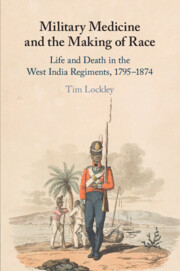Book contents
- Military Medicine and the Making of Race
- Military Medicine and the Making of Race
- Copyright page
- Dedication
- Contents
- Figures and Tables
- Acknowledgements
- Introduction
- 1 Medical Necessity and the Founding of the West India Regiments
- 2 The Ideal Soldier
- 3 The Use and Abuse of the Black Soldier
- 4 Statistics and the Reinterpretation of Black Bodies
- 5 Dehumanising the Black Soldier
- 6 Damage Done: The Asante Campaigns
- Conclusion
- Bibliography
- Index
4 - Statistics and the Reinterpretation of Black Bodies
Published online by Cambridge University Press: 13 March 2020
- Military Medicine and the Making of Race
- Military Medicine and the Making of Race
- Copyright page
- Dedication
- Contents
- Figures and Tables
- Acknowledgements
- Introduction
- 1 Medical Necessity and the Founding of the West India Regiments
- 2 The Ideal Soldier
- 3 The Use and Abuse of the Black Soldier
- 4 Statistics and the Reinterpretation of Black Bodies
- 5 Dehumanising the Black Soldier
- 6 Damage Done: The Asante Campaigns
- Conclusion
- Bibliography
- Index
Summary
Statistics relating to troop mortality in the British Empire had been collected systematically from 1816, but the first serious analysis came in the late 1830s. Alexander Tulloch investigated the causes of sickness and mortality among soldiers, specifically concentrating on establishing the relationship between race and mortality. The reports of West India Regiment surgeons provided him with the largest and most comprehensive data available for any people of African descent. Although it was readily apparent that black soldiers generally had lower sickness and mortality rates than white troops in the West Indies, in Tulloch’s opinion the mortality of black troops should have been even lower. If the black soldier was naturally suited to a West Indian climate, then mortality should be closer to that of Africans in Africa or Europeans in Europe. They fact that it was higher meant, according to Tulloch, that Africans were unsuited to life beyond Africa. The importance of Tulloch’s publications on military mortality was that they appeared just as public interest in statistics exploded, and his research was circulated widely in military and medical publications, helping to shape ideas about black bodies far beyond military circles.
- Type
- Chapter
- Information
- Military Medicine and the Making of RaceLife and Death in the West India Regiments, 1795–1874, pp. 113 - 138Publisher: Cambridge University PressPrint publication year: 2020



